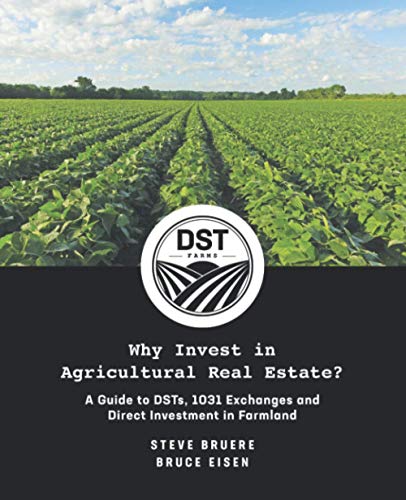Introduction
Are you looking to invest in farmland or interested in learning more about the industry? Look no further than this list of the 5 best farmland investing books of 2023. With insightful perspectives from industry experts, these books cover a wide range of topics including farmland investing strategies, sustainable agriculture, the impact of technology, and more. Whether you are an experienced farmland investor or a beginner looking to get started, these books will provide valuable knowledge and insights to help you make informed decisions and succeed in this exciting industry. So, without further ado, let’s dive into the 10 best farmland investing books of 2023.
The 5 Best Farmland Investing Books in 2023
The Investor’s Guide to Farmland: Investing in Agricultural Property

This book provides practical advice on investing in farmland and covers topics such as the benefits and risks of farmland investment, market trends, and property management. Key takeaways include the potential for farmland investment to provide a stable, long-term return on investment, the importance of market research, and the need for effective property management.
Rising Global Interest in Farmland: Can It Yield Sustainable and Equitable Benefits?

Summary:
Written by Klaus Deininger and Derek Byerlee, “Rising Global Interest in Farmland” discusses the worldwide trend of large-scale farmland acquisition by foreign investors and its potential impacts on rural development, food security, and the environment. The authors argue that while such investments can offer benefits, including access to capital, technology, and markets, they also pose risks and challenges that need to be addressed to ensure sustainability and equity. The book presents case studies and policy recommendations based on empirical research and stakeholder consultations.
Key takeaways:
- The global demand for food, fuel, and bioenergy, as well as the increasing scarcity and volatility of natural resources, have led to a surge in large-scale farmland acquisitions by foreign investors, especially in low- and middle-income countries.
- Farmland investments can provide capital, technology, and markets for local farmers and communities, but also create risks of displacement, land degradation, loss of biodiversity, and conflicts over resources and rights.
- The benefits and risks of farmland investments depend on various factors, such as the scale, purpose, location, governance, and participation of stakeholders, as well as the regulatory frameworks and enforcement mechanisms in place.
- To ensure sustainable and equitable outcomes, farmland investments need to be based on transparent and inclusive processes of negotiation, consultation, and consent, as well as on socially and environmentally responsible practices and standards.
Finding Good Farmland by Ann Larkin Hansen

Summary:
Finding Good Farmland is a guide to buying and managing farmland. The book covers the factors to consider when choosing a piece of farmland, how to assess the land’s productivity and suitability for different types of crops, and how to manage the land for long-term profitability. It also covers legal and financial considerations when buying farmland.
Key takeaways:
- Choosing the right piece of farmland is crucial for long-term profitability.
- Assessing the land’s productivity and suitability for different types of crops is essential for making informed decisions about what to grow.
- Proper land management is key to maximizing returns and ensuring long-term sustainability.
- The book provides a helpful overview of the legal and financial considerations when buying farmland.
The Lean Farm Guide to Growing Vegetables: A Guide to Sustainable and Profitable Small-Scale Farming

Summary: This book provides practical advice for small-scale farmers on how to optimize their production and profitability through the use of lean principles. The author draws on his experience running a successful small farm to offer insights into how farmers can reduce waste, improve efficiency, and increase quality.
Key Takeaways:
- Using lean principles can help small-scale farmers improve profitability and sustainability.
- Reducing waste and optimizing production can lead to a more efficient and profitable farm.
- Quality is just as important as quantity when it comes to sustainable farming.
Why Invest In Agricultural Real Estate? by Jeff Rothstein:

Summary: Why Invest in Agricultural Real Estate? is a guide to investing in agricultural real estate. The book covers the advantages of investing in this asset class, the different types of agricultural real estate investments available, and the potential risks and rewards of each. It also includes case studies and examples of successful agricultural real estate investments.
Key takeaways:
- Agricultural real estate can provide stable returns and diversification benefits to an investment portfolio.
- There are different types of agricultural real estate investments, including farmland, vineyards, orchards, and livestock operations.
- Understanding the local agricultural market and farming practices is crucial for making informed investment decisions.
- The book provides a helpful overview of the advantages and risks of investing in different types of agricultural real estate.
Conclusion
In conclusion, the world of farmland investing can be complex and intimidating, but these 10 books provide a wealth of knowledge and insights to help navigate the industry.
From practical strategies to environmental concerns, each book offers a unique perspective on farmland investing, giving readers a broad range of tools to approach the sector with confidence.
With the information provided in these books, investors can make informed decisions and take advantage of the opportunities presented by farmland investing.
So, whether you are a seasoned investor or just getting started, these books are an essential resource for anyone looking to succeed in the world of farmland investing.